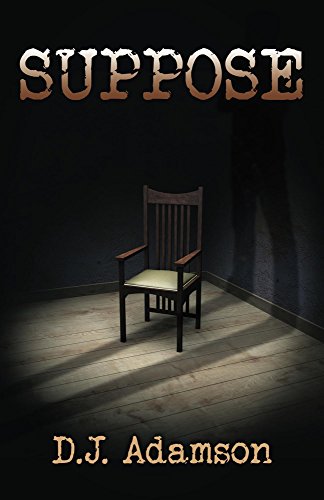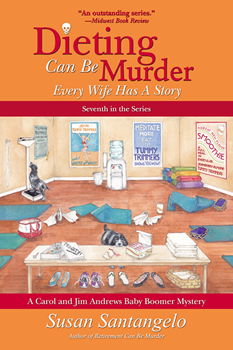

September 25 – October 1: “Is it difficult to write comedy into thrillers?”
 This week we’re discussing comedy and humor in the thriller genre: Is it difficult to write comedy or humor into thrillers? Is it necessary, desired, or just a tool to release the tension in some needed spots? Tune in as ITW Members Lisa Towles, Susan Santangelo, D. J. Adamson, Charlie Cochrane and Alex Lettau weigh in on the funny. Scroll down to the “comments” to follow what is sure to be a thrilling discussion!
This week we’re discussing comedy and humor in the thriller genre: Is it difficult to write comedy or humor into thrillers? Is it necessary, desired, or just a tool to release the tension in some needed spots? Tune in as ITW Members Lisa Towles, Susan Santangelo, D. J. Adamson, Charlie Cochrane and Alex Lettau weigh in on the funny. Scroll down to the “comments” to follow what is sure to be a thrilling discussion!
~~~~~
 D. J. Adamson is the author of the Lillian Dove Mystery series and the Deviation science fiction-suspense trilogy. Suppose, the second in the Lillian series has just been released. She also teaches writing and literature at Los Angeles colleges. And to keep busy when she is not writing or teaching, she is the Membership Director of the Los Angeles Sisters in Crime, Vice President of Central Coast Sisters in Crime and an active member of the Southern California Mystery Writers. Her books can be found and purchased in bookstores and on Amazon. Make friends with her on Facebook or Goodreads and LinkedIn.
D. J. Adamson is the author of the Lillian Dove Mystery series and the Deviation science fiction-suspense trilogy. Suppose, the second in the Lillian series has just been released. She also teaches writing and literature at Los Angeles colleges. And to keep busy when she is not writing or teaching, she is the Membership Director of the Los Angeles Sisters in Crime, Vice President of Central Coast Sisters in Crime and an active member of the Southern California Mystery Writers. Her books can be found and purchased in bookstores and on Amazon. Make friends with her on Facebook or Goodreads and LinkedIn.
 Lisa Towles is a lifelong writer and musician living in the San Francisco Bay Area. Born and raised in New England, she has lived in Connecticut, New Mexico, and southwest England. Lisa’s four previous fiction publications were written under her previous name of Lisa Polisar. She got married in 2009 and changed her name to Towles. She is an award-winning journalist, where she wrote for numerous commercial magazines and literary journals, writing features and covering the Santa Fe art scene in New Mexico. Her previous books include Knee Deep, Blackwater Tango, The Ghost of Mary Prairie, Escape: Dark Mystery Tales, as well as a non-fiction book on jazz improvisation called Straight Ahead. Lisa’s newest release, Choke, will release on June 22, 2017 in trade paperback, Kindle, and numerous other digital formats.
Lisa Towles is a lifelong writer and musician living in the San Francisco Bay Area. Born and raised in New England, she has lived in Connecticut, New Mexico, and southwest England. Lisa’s four previous fiction publications were written under her previous name of Lisa Polisar. She got married in 2009 and changed her name to Towles. She is an award-winning journalist, where she wrote for numerous commercial magazines and literary journals, writing features and covering the Santa Fe art scene in New Mexico. Her previous books include Knee Deep, Blackwater Tango, The Ghost of Mary Prairie, Escape: Dark Mystery Tales, as well as a non-fiction book on jazz improvisation called Straight Ahead. Lisa’s newest release, Choke, will release on June 22, 2017 in trade paperback, Kindle, and numerous other digital formats.
 Susan Santangelo is the author of the best-selling Baby Boomer mystery series, which follows a typical boomer couple, Carol and Jim Andrews, as they navigate their way along life’s bumpy road into their twilight years. Susan is a member of Sisters in Crime, International Thriller Writers, and the Cape Cod Writers Center. She divides her time between Cape Cod, MA and the Gulf Coast of Florida, and shares her life with her husband, Joe, and two spoiled English Cocker Spaniels, Boomer and Lilly. Boomer also serves as the model for the books’ front covers, and Lilly is pictured on the back cover of DIETING CAN BE MURDER, the seventh title in the series.
Susan Santangelo is the author of the best-selling Baby Boomer mystery series, which follows a typical boomer couple, Carol and Jim Andrews, as they navigate their way along life’s bumpy road into their twilight years. Susan is a member of Sisters in Crime, International Thriller Writers, and the Cape Cod Writers Center. She divides her time between Cape Cod, MA and the Gulf Coast of Florida, and shares her life with her husband, Joe, and two spoiled English Cocker Spaniels, Boomer and Lilly. Boomer also serves as the model for the books’ front covers, and Lilly is pictured on the back cover of DIETING CAN BE MURDER, the seventh title in the series.
 Because Charlie Cochrane couldn’t be trusted to do any of her jobs of choice—like managing a rugby team—she writes. Her mystery novels include the Edwardian era Cambridge Fellows series, series, and the contemporary Best Corpse for the Job. Multi-published, she has titles with Carina, Samhain, Riptide and Bold Strokes, among others. A member of the Romantic Novelists’ Association, Mystery People and International Thriller Writers Inc, Charlie regularly appears at literary festivals and at reader and author conferences with The Deadly Dames.
Because Charlie Cochrane couldn’t be trusted to do any of her jobs of choice—like managing a rugby team—she writes. Her mystery novels include the Edwardian era Cambridge Fellows series, series, and the contemporary Best Corpse for the Job. Multi-published, she has titles with Carina, Samhain, Riptide and Bold Strokes, among others. A member of the Romantic Novelists’ Association, Mystery People and International Thriller Writers Inc, Charlie regularly appears at literary festivals and at reader and author conferences with The Deadly Dames.
 Alex Lettau is the pen name of Ludwig Alexander Lettau MD, an infectious disease specialist in practice for over 30 years currently living in Charleston SC. He is also a former medical epidemiologist with the CDC’s Division of Viral Diseases. In addition to scientific articles, he has had 15 short medical humor pieces published in medical journals. In his Indie award-winning medical thriller Yellow Death, the protagonist Kris Jensen becomes accidentally infected with an unknown lethal hepatitis virus and has only five days left to find answers to its origin.
Alex Lettau is the pen name of Ludwig Alexander Lettau MD, an infectious disease specialist in practice for over 30 years currently living in Charleston SC. He is also a former medical epidemiologist with the CDC’s Division of Viral Diseases. In addition to scientific articles, he has had 15 short medical humor pieces published in medical journals. In his Indie award-winning medical thriller Yellow Death, the protagonist Kris Jensen becomes accidentally infected with an unknown lethal hepatitis virus and has only five days left to find answers to its origin.
- LAST GIRL MISSING with K.L. Murphy - July 25, 2024
- CHILD OF DUST with Yigal Zur - July 25, 2024
- THE RAVENWOOD CONSPIRACY with Michael Siverling - July 19, 2024
